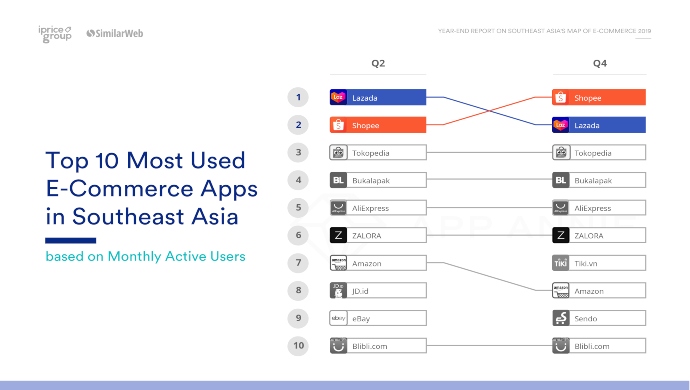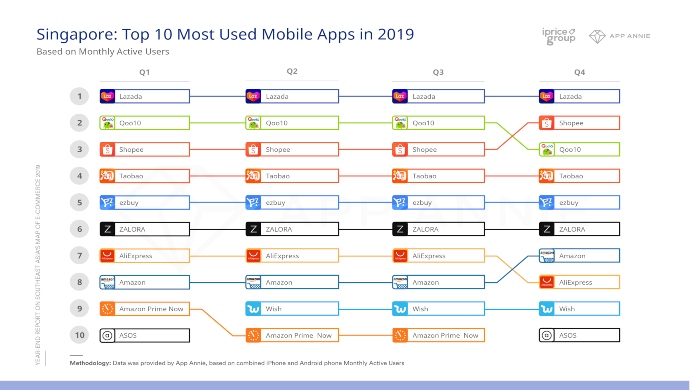
Singapore is the hub of the e-commerce sector in Southeast Asia, given its strategic position and economic status. From Singapore-headquartered firms like Lazada and Sea Group-owned Shopee to homegrown ones like Qoo100 and newcomer Amazon.sg, it seems like there’s a seat for everybody on the table.
However, according to the 2019 Yearend Report put together by iPrice, App Annie, and SimilarWeb, it’s still Lazada and Shopee that hold the key positions in the e-commerce race in the city-state. Both are the most actively used e-commerce shopping apps in 2019, according to App Annie, not only in Singapore but also in Southeast Asia.
The report goes into detail intending to keep track of the city-state’s world-class digital economy and ambition to achieve the Smart Nation status by analysing the most interesting developments of the top-performing e-commerce players in the Lion City as of 2019.

According to Google, Temasek & Bain company, the e-commerce industry in Singapore is predicted to contribute a total of US$6.8 billion in 2025, a 22 per cent increase from 2015. It signifies an ample room for further growth in the country’s e-commerce sector within the next five years, and from the looks of it, the ecosystem welcomes new players with open arms.
The report concludes with four insights regarding the e-commerce scene in the country:
Singapore as the vanguard
Lazada and Shopee, as Singapore-headquartered companies, were consistently the most actively used e-commerce apps in Singapore and Southeast Asia in 2019, according to App Annie. Data reveals that the two giants showed clear stability throughout the year, indicating strong customer loyalty.
Also Read: E-commerce wars in Vietnam intensify. Here is all you need to know
For web visits, Shopee maintains its stability in 2019 both in desktop and mobile web platforms, garnering more than two billion visitors across Southeast Asia.
On the other hand, Lazada continued to thrive on the market share in Southeast Asia, as it experienced a 13 per cent growth in visits as of 2019.
Singapore-focussed e-commerce company
Singapore’s e-commerce sector already has two early unicorns — Sea Group (owner of Shopee) and Lazada. Despite the tight competition against these two, Qoo100 (formerly known as GMarket) maintained a strong presence in 2019.

Not a unicorn itself, Qoo100 managed to come through the other end sitting on the second most-visited e-commerce website platform, with almost 30 per cent of the web market share in Singapore as of 2019. The same also goes for its app, up until the third quarter in 2019 before it slid to 3rd position in the fourth quarter.
Growth of Amazon.sg since its debut
Amazon has recently launched in Singapore under Amazon.sg, and it quickly rocketed into the 4th position.
It managed to garner more visits than older e-commerce portals within a quarter, which is the result of its localisation strategy to tailor their products to Singaporeans, according to the report.
Also Read: How ShopBack sweetens shopping in Southeast Asia
Both Amazon Prime Now and Amazon apps also remained in the top 10 most-used e-commerce shopping apps as of 2019’s fourth quarter. The report further predicts that due to its nature of various inventory of products and local and international shipping reach, the company is most likely to increase the demand of local consumers in Singapore in 2020.
Singapore to outgrow the pond
According to the report, Singapore is at the forefront of having the highest average basket size in Southeast Asia. In 2019, shoppers in Singapore had an average basket size of US$69 on Single’s Day.
The high spending on online sales events was driven by the positive interest of consumers of the sales event paired with extravagant deals & marketing initiatives by various e-commerce companies.
Moreover, many possibilities that most likely led to high spending on online sales events were probably due to high per capita incomes. With its maturity in technological advancement, the average order values in Singapore’s e-commerce sector are 3-4 times higher than its neighbouring countries.
—
Photo by Bench Accounting on Unsplash
The post Singapore’s e-commerce is getting stronger thanks to highest per capita income in the region: iPrice report appeared first on e27.